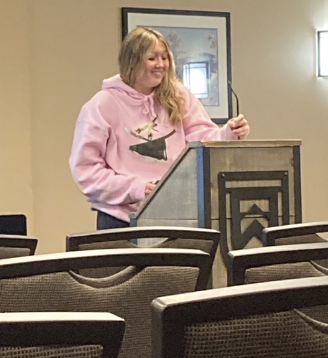
By Chelsea Pond
Pippa Scott, a Killington Mountain School student, speaks at Killington’s Grand Hotel about teen suicide.
By Chelsea Pond
The Community News Service is a program in which University of Vermont students work with professional editors to provide content for local news outlets at no cost.
On Sunday, Feb. 18, a frigid and snowy night at the Killington Grand Hotel, non-profit organization Ride for Mental Health held an event to raise money and educate attendees about the importance of mental health.
The organization, started by 17-year-old Killington Mountain School student Pippa Scott, aims to prevent suicide, remove the stigma associated with mental health and openly talk to kids who are struggling. Scott was driven to create the organization after losing three of her teammates over the years to suicide.
The main event was a presentation from Scott, that she said she wanted “to be more like a conversation.”
She proceeded to create a very personal and peaceful environment, asking the audience questions and having people raise their hand if they could relate or agree with what she was saying.
People shared their stories about the effects of mental health and suicide. One crowd member shared how their co-workers have died by suicide, while another shared the effect their job has on their mental health.
Scott then emphasized the importance of mental health awareness, especially in teenagers. She shared that suicide is the second leading cause of death among people aged 10 to 34 in the U.S., and that nearly 20% of high school students report serious consideration of suicide within a 12-month period. On top of that, Scott stated that 95% of teenagers have access to a smartphone leading to increasing social media pressure and cyberbullying.
“Now, the simplest [solution] I can see for this is for everyone to throw out their phones and not use social media. That solves nothing, because that will never happen—it is super unrealistic,” Scott said. “We need to make social media a more positive place for people to talk. We need to make it so that there aren’t unrealistic goals via Photoshop and you’re not only posting the best parts of your life.”
As a KMS athlete herself, Scott also spoke to mental health in sports, including the pressure to succeed and the sense of failure when you don’t, the connection athletes have to their sport and the impact it can have when they are not able to compete. To Scott, one of the most crucial pieces of this is speaking with and educating coaches about mental health.
“We tend to spend so much time talking to coaches because they’re the ones who are with the athletes the most. They’re the ones who are seeing when their athletes are pushing themselves to the limit,” Scott said, adding, “educating coaches can save so many lives.”
When asked about the future of the organization, Scott spoke of the struggles of fundraising with a small non-profit.
“Nobody really wants to give money to a small non-profit,” Scott said.
Despite that, she has plans to focus on expanding and talking with bigger brands that have to do with mental health.
For more information, visit the Ride for Mental Health website at: rideformh.org.




